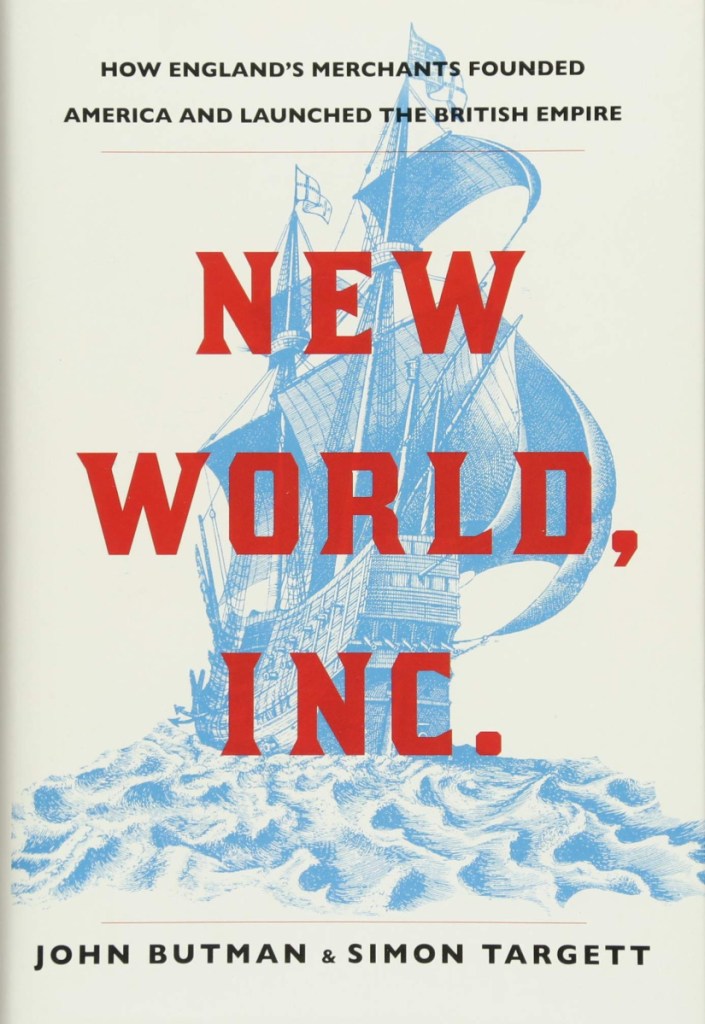So you think you know how America was “made,” as the subtitle of “New World, Inc.” has it. It’s fair to say we all grow up knowing that the Pilgrims came first. Mainers, of course, soon learn that George Popham got to Popham Beach 13 years earlier, in 1607. Virginians point to the one-armed Christopher Newport, who landed at Jamestown the same year.
In “New World, Inc.,” John Butman and Simon Targett explain that the impulse to reach the New World, though not usually successfully, goes considerably further back. Butman, who styles himself as a “collaborating writer” and has written books as well as stories for major newspapers and magazines, divides his time between Portland and Bailey Island. Targett is a writer, historian and media advisor who lives in London.
The authors disabuse us of the notion that religion – either to proselytize about or to escape persecution from – had very much to do with these forays.
Their first sentence states the reason boldly. “The story begins with sheep.” Wool was the product that made England rich, and early in the 16th century, various factors – natural, as well as political – were putting the whole enterprise at risk. A few far-sighted scholars diagnosed the problem as the disparity in wealth between the rich landowners and the rest. The result was the threat of rebellion and economic doom.
Trade with China, or Cathay, was the answer, and a route to its riches more direct than rounding Africa would be the means. The first of Butman and Targett’s “adventurers” in fact headed northeast, hoping to find a passage above Ivan the Terrible’s Russia. This was the Muscovy Company, and the year was 1554.
From this point, the authors take off on a riveting tale of business intrigue, international skullduggery and maritime disaster. Above all, sheer determination marked these men, whether at court, in the halls of commerce or in the wilderness. In the 65 years that separated the Muscovy Company from the Pilgrims, the goals of these merchant adventurers evolved from searching for trade routes (first to China, then the New World), to establishing entrepôts along the way, and finally to succumbing to the siren call of empire-building in the New World.
All this played out against a backdrop of great political uncertainty. A captain who had been at sea for perhaps years might return to find a different sovereign on the throne with very different aims and alliances, and it could be potentially fatal to him. The period covered by “New World, Inc.” starts during the reigns of the Protestant Edward VI and the Catholic “Bloody” Mary I, each of whom ruled for five years. In the end, Protestant Elizabeth I was on the throne for 45 years, but it was anything but certain, at least in the early years. Finally, James I ushered in a period of peace, notably with the arch-rival Spanish Empire, but that spelled bad news for Sir Walter Raleigh, who was finally executed for deeds of derring-do that Elizabeth would have rewarded.
Raleigh is one of the book’s few protagonists – Sir Francis Drake is another – whose names are still well known. The majority, major players at the time, are largely forgotten. Their memory is preserved, the authors tell us, as “cartographical traces,” in the names of often obscure places: Frobisher Bay, Loks Land and, yes, Popham Beach.
There are lots of them, and it is to their great credit that the authors mostly make it possible for the reader to keep them straight. The book also includes a helpful “Cast of Characters: The Seventy-Five Men and Women who Helped Make America.”
“New World, Inc.” is punctuated with wonderfully revealing quotes and facts. One Elizabethan courtier argued for developing American trade on the ground that since most of it was northern, the inhabitants “shall have wonderful great use of our said English clothes” (sheep again). An early settler understood from the Native Americans that their name for Roanoke was Wingandacoia, only to have it transpire somewhat later that what he had really been told was, “What fine clothes you’re wearing.” Popham’s father, who underwrote the expedition to Maine, was a high court judge who convicted Raleigh to a grisly traitor’s death, fortunately commuted by King James to a simple beheading.
The authors’ lively style is another asset. Queen Elizabeth’s astrologer writing a geographical tract “dictated this rambling screed to an amanuensis in a manic six-day explosion of ideas.” Together they have produced a highly readable book that will open most readers’ eyes to a fascinating and little known page of history.
Thomas Urquhart is a former director of Maine Audubon; he is currently writing a history of Maine’s settlement and the Public Lots.
Send questions/comments to the editors.



Success. Please wait for the page to reload. If the page does not reload within 5 seconds, please refresh the page.
Enter your email and password to access comments.
Hi, to comment on stories you must . This profile is in addition to your subscription and website login.
Already have a commenting profile? .
Invalid username/password.
Please check your email to confirm and complete your registration.
Only subscribers are eligible to post comments. Please subscribe or login first for digital access. Here’s why.
Use the form below to reset your password. When you've submitted your account email, we will send an email with a reset code.